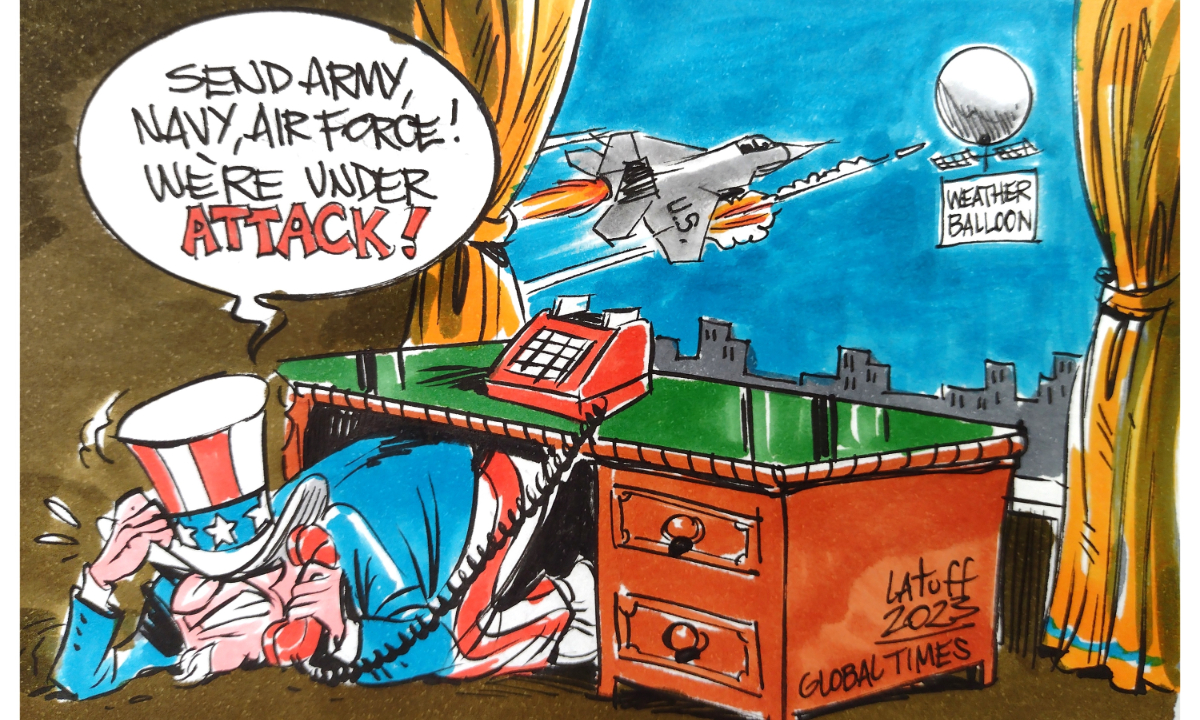The US a thief who falsely accuses others of stealing to cover up its own crimes

US overreacts by shooting down Chinese weather balloon. Cartoon: Carlos Latuff
The US insists that the Chinese civilian research airship that was researching the weather but accidentally flew off course over the American mainland was a clandestine reconnaissance vehicle. It was on this pretext, which hasn't been supported by evidence and was vehemently denied by China, that US President Joe Biden ordered the Pentagon to shoot the airship down over the Atlantic Ocean. That dramatic decision violated the spirit of international law and related practices.
Everything that the US has claimed about the weather balloon incident has been nothing but a lot of hot air and hype. Chinese Foreign Ministry spokesperson Wang Wenbin revealed on February 13 during a regular press briefing that US high-altitude balloons have illegally flown over Chinese airspace on more than 10 occasions without the approval of the relevant Chinese authorities since January 2022. He also disclosed that the US resorted to more dangerous means for spying on China too.
According to him, "The US has also frequently sent aircraft and warships to conduct close-in reconnaissance on China, with 657 flights in 2022 and 64 flights in the South China Sea in January this year alone." These revelations and the timing thereof enable everyone to better understand why the balloon incident was a lot of hot air and hype. For starters, it's the US that has engaged in espionage and abused the use of its armed forces across the world. Washington is thus in no position to lecture China.
Second, as evidenced by Wang's remarks, China responsibly handled all such violations of international law in accordance with related customary practices by addressing them discretely behind closed doors. It wisely decided not to hype them up in order to avoid further worsening bilateral relations that have already been deteriorating as a result of the US' unilateral hybrid war aggression against China. This is the proper way for mature countries to resolve such incidents.
The third point of criticism related to how the US handled the weather balloon incident earlier this month is that its decision-makers deliberately chose to defy those previously mentioned customary practices and ultimately violate international law by shooting down China's civilian airship. Against the backdrop of what Chinese Foreign Ministry spokesman Wang just revealed, this confirms that the US had politically self-interested reasons in manipulating global perceptions about China and this incident.
Building upon the above, the fourth point relates to the impression that all objective observers now have of the US being the thief who dishonestly accuses others of stealing in order to cover up their own crimes. The US must have known that China would reveal its spying operations on China in the aftermath of American perception managers hyping up the weather balloon incident, but it still shamelessly thought that it could achieve some short-term benefit by blowing hot air around.
And finally, while it can't be known what exactly motivated the US to engage in such an unfriendly act against China, there's no doubt that its hegemonic hubris played a major role in influencing its counterproductive calculations. Had US decision-makers calmly thought everything through, they'd never have hyped up the accidental overflight of a Chinese civilian airship researching the weather since they'd have realized how aggressive, hypocritical, and paranoid it would make their country look.
In hindsight, the Chinese civilian weather balloon incident will go down in history as an example of a hubristic hegemon projecting its own crimes onto an innocent country and then overreacting out of guilt by violating international law and related practices to ridiculously shoot down that wayward object. Far from being the moment of pride that the Biden Administration is trying to spin it as, it's an embarrassment that never should have happened and only makes the US look worse than ever before.
The author is a Moscow-based American political analyst. opinion@globaltimes.com.cn



